The Films of Joel Schumacher
Virginia Hill
Amateur Night at the Dixie Bar and Grill
The Incredible Shrinking Woman
D.C. Cab
St. Elmo's Fire
The Lost Boys (February 17/12)
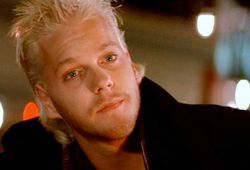 The Lost Boys follows single mother Lucy Emerson (Dianne Wiest) as she moves to a sleepy coastal town with her two sons, Sam (Corey Haim) and Michael (Jason Patric), and immediately sets out to integrate her small family into the local community. And while Sam quickly befriends a goofy pair of comic-book denizens (Corey Feldman's Edgar and Jamison Newlander's Alan), Michael, in pursuing a local beauty (Jami Gertz's Star), falls in with a group of mysterious teenagers and immediately clashes with their enigmatic leader (Kiefer Sutherland's David). It is, of course, not long before Michael makes the shocking discovery that David and his gang are, in fact, vampires, with the movie subsequently detailing David's efforts at adapting to his decidedly unconventional new way of life. Director Joel Schumacher has infused The Lost Boys with a slick sensibility that proves effective at highlighting its '80s origins, with the film's proliferation of dated elements - eg the shirtless, greased-up saxophone player - contributing heavily to its atmosphere of kitschy nostalgia. And while it's impossible not to get a kick out of the various familiar faces within the cast, Schumacher's decision to employ an almost incongruously deliberate pace ensures that the movie never quite becomes the engrossing, consistently watchable endeavor one might've expected - with the lack of momentum exacerbated by Janice Fischer, James Jeremias, and Jeffrey Boam's excessively episodic screenplay (ie too much of The Lost Boys revolves around Michael's uneventful exploits). The over-the-top climax admittedly does resuscitate the viewer's dwindling interest, and it is, finally, impossible to label the movie as anything more than a passable yet unspectacular relic of the 1980s.
The Lost Boys follows single mother Lucy Emerson (Dianne Wiest) as she moves to a sleepy coastal town with her two sons, Sam (Corey Haim) and Michael (Jason Patric), and immediately sets out to integrate her small family into the local community. And while Sam quickly befriends a goofy pair of comic-book denizens (Corey Feldman's Edgar and Jamison Newlander's Alan), Michael, in pursuing a local beauty (Jami Gertz's Star), falls in with a group of mysterious teenagers and immediately clashes with their enigmatic leader (Kiefer Sutherland's David). It is, of course, not long before Michael makes the shocking discovery that David and his gang are, in fact, vampires, with the movie subsequently detailing David's efforts at adapting to his decidedly unconventional new way of life. Director Joel Schumacher has infused The Lost Boys with a slick sensibility that proves effective at highlighting its '80s origins, with the film's proliferation of dated elements - eg the shirtless, greased-up saxophone player - contributing heavily to its atmosphere of kitschy nostalgia. And while it's impossible not to get a kick out of the various familiar faces within the cast, Schumacher's decision to employ an almost incongruously deliberate pace ensures that the movie never quite becomes the engrossing, consistently watchable endeavor one might've expected - with the lack of momentum exacerbated by Janice Fischer, James Jeremias, and Jeffrey Boam's excessively episodic screenplay (ie too much of The Lost Boys revolves around Michael's uneventful exploits). The over-the-top climax admittedly does resuscitate the viewer's dwindling interest, and it is, finally, impossible to label the movie as anything more than a passable yet unspectacular relic of the 1980s.


 out of
out of 



Cousins
Flatliners (October 14/17)
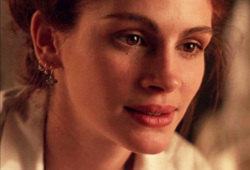 An intriguing premise in search of a compelling movie, Flatliners follows a cadre of ambitious medical students (Kiefer Sutherland's Nelson, Julia Roberts' Mannus, Kevin Bacon's Labraccio, William Baldwin's Hurley, and Oliver Platt's Steckle) as they embark on an experiment to discover if there truly is life after death. Filmmaker Joel Schumacher delivers a fairly compelling opening stretch that seems to promise a creepy, thrilling horror flick, with the movie benefiting substantially from its affable cast and strong (if occasionally distracting) visual sensibilities. And yet Flatliners remains unable to wholeheartedly capture the viewer's interest for the duration of its occasionally interminable running time, as scripter Peter Filardi delivers a meandering and repetitive narrative that often feels episodic in its execution (ie the story lurches from one participant's post-experiment experiences to the next with little thought of a bigger picture). By the time the decidedly anticlimactic final stretch rolls around, Flatliners has squandered its strong setup to become nothing more than a truly (and disappointingly) forgettable medical thriller.
An intriguing premise in search of a compelling movie, Flatliners follows a cadre of ambitious medical students (Kiefer Sutherland's Nelson, Julia Roberts' Mannus, Kevin Bacon's Labraccio, William Baldwin's Hurley, and Oliver Platt's Steckle) as they embark on an experiment to discover if there truly is life after death. Filmmaker Joel Schumacher delivers a fairly compelling opening stretch that seems to promise a creepy, thrilling horror flick, with the movie benefiting substantially from its affable cast and strong (if occasionally distracting) visual sensibilities. And yet Flatliners remains unable to wholeheartedly capture the viewer's interest for the duration of its occasionally interminable running time, as scripter Peter Filardi delivers a meandering and repetitive narrative that often feels episodic in its execution (ie the story lurches from one participant's post-experiment experiences to the next with little thought of a bigger picture). By the time the decidedly anticlimactic final stretch rolls around, Flatliners has squandered its strong setup to become nothing more than a truly (and disappointingly) forgettable medical thriller.

 out of
out of 



Dying Young
Falling Down
The Client
Batman Forever
A Time to Kill
Batman & Robin
8MM
Flawless
Tigerland (March 5/02)
 It's not surprising that Joel Schumacher would elect to make a low-budget flick like Tigerland. After he was practically ostracized from Hollywood for destroying the Batman franchise, the director did the smart thing and stayed out of the spotlight for a little while. He bounced back with the gritty and violent thriller 8mm, which was refreshingly free of sentiment. With Tigerland, Schumacher earns the right to call himself a filmmaker once again. Set in the early '70s, Tigerland, which refers to a training camp on the outskirts of the battle, follows several recruits as they're exposed to a practice version of the real-life conflict - including Colin Farrell's Roland Bozz. Tigerland is exceedingly familiar - from its well-worn story to the various stereotypical characters - but with a story like this, that's not necessarily a bad thing. Most war movies of this ilk, in which we see recruits of different backgrounds getting acclimatized to their new settings, often rely on what works, and Tigerland is no different - as the film introduces the viewer to a variety of cliched personas. But the heart of Tigerland is Farrell's relationship with his surroundings, which seems to waver between hatred and grim acceptance. This is a guy who knows how to work the system (such as when he manages to secure an early release for a homesick cadet) as well as he knows how to push just the right buttons on his superiors. And though the rest of the cast consists mostly of the stereotypical characters you might expect, Cole Hauser pops up late in the film and makes quite an impact. As a grizzled and somewhat bitter soldier, Hauser brings some much-needed intensity to the film. Tigerland is ultimately an effective look at the training process that recruits have to endure, but never quite catches fire or becomes the searing expose that director Schumacher presumably intended.
It's not surprising that Joel Schumacher would elect to make a low-budget flick like Tigerland. After he was practically ostracized from Hollywood for destroying the Batman franchise, the director did the smart thing and stayed out of the spotlight for a little while. He bounced back with the gritty and violent thriller 8mm, which was refreshingly free of sentiment. With Tigerland, Schumacher earns the right to call himself a filmmaker once again. Set in the early '70s, Tigerland, which refers to a training camp on the outskirts of the battle, follows several recruits as they're exposed to a practice version of the real-life conflict - including Colin Farrell's Roland Bozz. Tigerland is exceedingly familiar - from its well-worn story to the various stereotypical characters - but with a story like this, that's not necessarily a bad thing. Most war movies of this ilk, in which we see recruits of different backgrounds getting acclimatized to their new settings, often rely on what works, and Tigerland is no different - as the film introduces the viewer to a variety of cliched personas. But the heart of Tigerland is Farrell's relationship with his surroundings, which seems to waver between hatred and grim acceptance. This is a guy who knows how to work the system (such as when he manages to secure an early release for a homesick cadet) as well as he knows how to push just the right buttons on his superiors. And though the rest of the cast consists mostly of the stereotypical characters you might expect, Cole Hauser pops up late in the film and makes quite an impact. As a grizzled and somewhat bitter soldier, Hauser brings some much-needed intensity to the film. Tigerland is ultimately an effective look at the training process that recruits have to endure, but never quite catches fire or becomes the searing expose that director Schumacher presumably intended.


 out of
out of 



Bad Company (May 31/02)
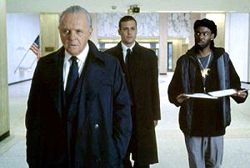 Bad Company, the latest mindless action movie from super-producer Jerry Bruckheimer, essentially scrapes the bottom of the barrel for this dying genre. A horrible lead performance by Chris Rock, combined with some flashy but distracting direction by Joel Schumacher, equals a mess that makes Armageddon look like The French Connection. Bad Company, which follows Chris Rock's Jake Hayes as he's recruited to impersonate his CIA-agent twin brother, is inept on so many levels, it's almost impossible to know where to start - though Rock's incredibly bad performance is certainly the most obvious place. While Rock's never exactly been a master thespian, at least in his previous attempts at acting he came off as likable. It helps that in his most successful roles he wasn't asked to do much more than drop a one-liner every now and then (Nurse Betty being the most prominent example of this). But here, given a serious leading role and asked to perform opposite no less than Anthony Hopkins, Rock fails and fails miserably. (This is arguably the worst lead performance in a mainstream movie ever.) While Rock does have a scant few moments where he's actually not horrible, the actor's response to virtually everything that happens to his character is to scream (and scream loudly). Never once does he actually appear to be acting; he always looks as though he's either reading cue cards off camera or struggling to remember his poorly written lines. He just seems uncomfortable, as though he knew he were awful and he was just waiting for someone to fire him. As for Hopkins, though he's still far better than Rock could ever hope to be, this is certainly one of his worst performances. He just looks embarrassed, and who can blame him? He's often said that he's in acting just for the money, and that's never been truer than it is here. The rest of the actors don't really make much of an impact, though most supporting characters are far more charismatic than Rock could ever hope to be (and their screen time is quite limited). Bad Company's been directed by Joel Schumacher, and this just proves what most people have known all along: Keep this man as far away from a camera as possible. Not content with having ruined the Batman franchise, he's moved onto cajoling terrible performances out of Oscar-winning actors. But besides the lack of depth in the film's various characters, Bad Company doesn't even work as an escapist action movie. Its PG-13 rating guarantees that nobody is going to get brutally murdered and though a lot of people are gunned down, it's always from a distance. There should have been a note at the end of the credits that read, "No squibs were harmed in the making of this movie." Bad Company was delayed in the wake of September 11th due to a plot development in the final act, but it's easy enough to wish it had just been buried. It'll likely end Rock's attempt to break out of comedy roles (as well it should), while Schumacher will hopefully be relegated to lower budget films like Tigerland (which actually wasn't that bad). As for poor Anthony Hopkins, let's just hope he was paid a lot of money.
Bad Company, the latest mindless action movie from super-producer Jerry Bruckheimer, essentially scrapes the bottom of the barrel for this dying genre. A horrible lead performance by Chris Rock, combined with some flashy but distracting direction by Joel Schumacher, equals a mess that makes Armageddon look like The French Connection. Bad Company, which follows Chris Rock's Jake Hayes as he's recruited to impersonate his CIA-agent twin brother, is inept on so many levels, it's almost impossible to know where to start - though Rock's incredibly bad performance is certainly the most obvious place. While Rock's never exactly been a master thespian, at least in his previous attempts at acting he came off as likable. It helps that in his most successful roles he wasn't asked to do much more than drop a one-liner every now and then (Nurse Betty being the most prominent example of this). But here, given a serious leading role and asked to perform opposite no less than Anthony Hopkins, Rock fails and fails miserably. (This is arguably the worst lead performance in a mainstream movie ever.) While Rock does have a scant few moments where he's actually not horrible, the actor's response to virtually everything that happens to his character is to scream (and scream loudly). Never once does he actually appear to be acting; he always looks as though he's either reading cue cards off camera or struggling to remember his poorly written lines. He just seems uncomfortable, as though he knew he were awful and he was just waiting for someone to fire him. As for Hopkins, though he's still far better than Rock could ever hope to be, this is certainly one of his worst performances. He just looks embarrassed, and who can blame him? He's often said that he's in acting just for the money, and that's never been truer than it is here. The rest of the actors don't really make much of an impact, though most supporting characters are far more charismatic than Rock could ever hope to be (and their screen time is quite limited). Bad Company's been directed by Joel Schumacher, and this just proves what most people have known all along: Keep this man as far away from a camera as possible. Not content with having ruined the Batman franchise, he's moved onto cajoling terrible performances out of Oscar-winning actors. But besides the lack of depth in the film's various characters, Bad Company doesn't even work as an escapist action movie. Its PG-13 rating guarantees that nobody is going to get brutally murdered and though a lot of people are gunned down, it's always from a distance. There should have been a note at the end of the credits that read, "No squibs were harmed in the making of this movie." Bad Company was delayed in the wake of September 11th due to a plot development in the final act, but it's easy enough to wish it had just been buried. It'll likely end Rock's attempt to break out of comedy roles (as well it should), while Schumacher will hopefully be relegated to lower budget films like Tigerland (which actually wasn't that bad). As for poor Anthony Hopkins, let's just hope he was paid a lot of money.
 out of
out of 



Phone Booth (October 1/02)
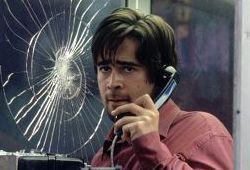 Colin Farrell is one of the few up-and-coming actors who actually deserves all his success. Ever since his astounding leading-man debut in Tigerland, he's been cranking out one amazing performance after another. Phone Booth, in actuality, was made quite a while ago - right after Tigerland, actually - and was delayed presumably in an effort to capitalize on Farrell's rising star. It's finally seeing the light of day, and despite Joel Schumacher's best efforts, it's not a bad little film. Farrell stars as Stu, a high-priced and powerful agent who's seemingly always on his cell phone. He doesn't really have much concern for those around him, and thinks nothing of lying to get what he wants (and needs). His daily routine includes a stop to a single phone booth, where he chats with a young woman he's trying to have an affair with (Katie Holmes). He doesn't call her on his cell phone to prevent his wife (Radha Mitchell) from finding out. After making one such call, the phone in the booth rings. Stu picks it up and finds himself talking to someone who knows things he shouldn't about his personal life. After threatening to hang up, Stu is told that if he does so, he will be shot. The rest of the film takes place around that phone booth, as the authorities are called in and Stu becomes increasingly frantic. It's a simple premise, but the script by b-movie veteran Larry Cohen contains enough surprises and revelations to propel the story forward. And, of course, there's Farrell's completely hypnotic central performance. Even if the screenplay had been a mishmash of cliches and horrible dialogue, Farrell's acting would've at least elevated the material to something watchable. As he's proven in films like Hart's War and The Recruit, Farrell has this amazing ability to make even the lamest storyline seem at least somewhat interesting. He really is one of the best young actors out there, and Phone Booth is certainly a superb vehicle for his ample talent. But what prevents the film from becoming a crackerjack thriller of Breakdown proportions, is Joel Schumacher's over-cranked sense of direction. Phone Booth's script is so effective it really doesn't need much in the way of visual assistance, but Schumacher's misguided sense of style becomes more distracting more than anything else. His trick of having whoever Stu calls appear in a small window on screen, for example, is completely unnecessary and serves only as an annoyance to the audience. Still, there's no denying that Phone Booth is mostly an exemplary thriller - a rarity nowadays.
Colin Farrell is one of the few up-and-coming actors who actually deserves all his success. Ever since his astounding leading-man debut in Tigerland, he's been cranking out one amazing performance after another. Phone Booth, in actuality, was made quite a while ago - right after Tigerland, actually - and was delayed presumably in an effort to capitalize on Farrell's rising star. It's finally seeing the light of day, and despite Joel Schumacher's best efforts, it's not a bad little film. Farrell stars as Stu, a high-priced and powerful agent who's seemingly always on his cell phone. He doesn't really have much concern for those around him, and thinks nothing of lying to get what he wants (and needs). His daily routine includes a stop to a single phone booth, where he chats with a young woman he's trying to have an affair with (Katie Holmes). He doesn't call her on his cell phone to prevent his wife (Radha Mitchell) from finding out. After making one such call, the phone in the booth rings. Stu picks it up and finds himself talking to someone who knows things he shouldn't about his personal life. After threatening to hang up, Stu is told that if he does so, he will be shot. The rest of the film takes place around that phone booth, as the authorities are called in and Stu becomes increasingly frantic. It's a simple premise, but the script by b-movie veteran Larry Cohen contains enough surprises and revelations to propel the story forward. And, of course, there's Farrell's completely hypnotic central performance. Even if the screenplay had been a mishmash of cliches and horrible dialogue, Farrell's acting would've at least elevated the material to something watchable. As he's proven in films like Hart's War and The Recruit, Farrell has this amazing ability to make even the lamest storyline seem at least somewhat interesting. He really is one of the best young actors out there, and Phone Booth is certainly a superb vehicle for his ample talent. But what prevents the film from becoming a crackerjack thriller of Breakdown proportions, is Joel Schumacher's over-cranked sense of direction. Phone Booth's script is so effective it really doesn't need much in the way of visual assistance, but Schumacher's misguided sense of style becomes more distracting more than anything else. His trick of having whoever Stu calls appear in a small window on screen, for example, is completely unnecessary and serves only as an annoyance to the audience. Still, there's no denying that Phone Booth is mostly an exemplary thriller - a rarity nowadays.


 out of
out of 



Veronica Guerin
The Phantom of the Opera
The Number 23 (February 20/07)
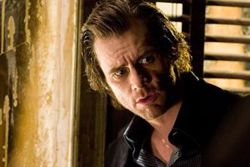 Although there are several elements within The Number 23 worth recommending - ie Jim Carrey's gritty, surprisingly effective performance - the film is ultimately undone by its thoroughly absurd premise (which, while initially intriguing, eventually becomes flat-out silly). Fernley Phillips' screenplay - which casts Carrey as a mild-mannered dog catcher named Walter - emphasizes coincidence to an absurd degree, as Carrey's character starts to notice the number 23 in virtually every aspect of his life. Spurred on by a mysterious novel, Walter finds himself becoming more and more obsessed with a decades-old murder - much to the concern of his wife (Virginia Madsen) and son (Logan Lerman). Director Joel Schumacher generally does an effective job of infusing The Number 23 with an appropriately dark sensibility, although the filmmaker's use of gothic visuals - primarily during sequences in which Carrey and Madsen re-enact various passages from the titular novel - becomes tedious almost immediately. It certainly doesn't help that the stuff from the book comes off as impossibly bland, with Carrey trapped within the confines of an egregiously generic cop thriller. Not that the central storyline is much better; Phillips' continual use of the number 23 as a sinister element within Walter's life might impress numerologists, but will almost surely leave most rational viewers rolling their eyes. It's ultimately painfully clear that Walter's increasingly paranoid behavior would've been better suited to a low-key drama, as the film simply does not work as a thriller.
Although there are several elements within The Number 23 worth recommending - ie Jim Carrey's gritty, surprisingly effective performance - the film is ultimately undone by its thoroughly absurd premise (which, while initially intriguing, eventually becomes flat-out silly). Fernley Phillips' screenplay - which casts Carrey as a mild-mannered dog catcher named Walter - emphasizes coincidence to an absurd degree, as Carrey's character starts to notice the number 23 in virtually every aspect of his life. Spurred on by a mysterious novel, Walter finds himself becoming more and more obsessed with a decades-old murder - much to the concern of his wife (Virginia Madsen) and son (Logan Lerman). Director Joel Schumacher generally does an effective job of infusing The Number 23 with an appropriately dark sensibility, although the filmmaker's use of gothic visuals - primarily during sequences in which Carrey and Madsen re-enact various passages from the titular novel - becomes tedious almost immediately. It certainly doesn't help that the stuff from the book comes off as impossibly bland, with Carrey trapped within the confines of an egregiously generic cop thriller. Not that the central storyline is much better; Phillips' continual use of the number 23 as a sinister element within Walter's life might impress numerologists, but will almost surely leave most rational viewers rolling their eyes. It's ultimately painfully clear that Walter's increasingly paranoid behavior would've been better suited to a low-key drama, as the film simply does not work as a thriller.

 out of
out of 



Blood Creek
Twelve
Trespass (October 29/11)
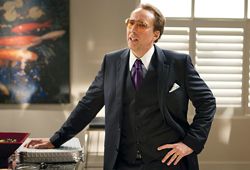 Directed by Joel Schumacher, Trespass details the chaos that ensues after masked assailants break into a wealthy couple's (Nicolas Cage's Kyle and Nicole Kidman's Sarah) opulent country estate - with the film subsequently revolving around the ongoing battle of wills that ensues between the various characters. There's little doubt that Trespass starts out with a fair amount of promise, as Schumacher does a decent job of exploiting the movie's inherently engrossing premise - with the watchable vibe heightened by Cage's typically idiosyncratic turn as the film's off-kilter protagonist. (Kidman, on the other hand, delivers a bland performance that is, for the most part, echoed in the less-than-engrossing work from her villainous co-stars.) There does reach a point, however, at which the one-note nature of Karl Gajdusek's script becomes an insurmountable obstacle, as the majority of Trespass' second half seems to involve a lot of yelling and arguing among the various characters. The increasingly stagnant atmosphere results in a lack of tension that grows increasingly problematic as time progresses, as there's just never a point at which the viewer is able to work up any real sympathy for Kyle and Sarah's perilous predicament. By the time the laughably overblown finale rolls around, Trespass has certainly established itself as a missed opportunity of distressing proportions - which is a shame, certainly, given how much fun Cage is clearly having here (eg his character refers to the individual intruders as, among other things, "assfuck" and "shithole").
Directed by Joel Schumacher, Trespass details the chaos that ensues after masked assailants break into a wealthy couple's (Nicolas Cage's Kyle and Nicole Kidman's Sarah) opulent country estate - with the film subsequently revolving around the ongoing battle of wills that ensues between the various characters. There's little doubt that Trespass starts out with a fair amount of promise, as Schumacher does a decent job of exploiting the movie's inherently engrossing premise - with the watchable vibe heightened by Cage's typically idiosyncratic turn as the film's off-kilter protagonist. (Kidman, on the other hand, delivers a bland performance that is, for the most part, echoed in the less-than-engrossing work from her villainous co-stars.) There does reach a point, however, at which the one-note nature of Karl Gajdusek's script becomes an insurmountable obstacle, as the majority of Trespass' second half seems to involve a lot of yelling and arguing among the various characters. The increasingly stagnant atmosphere results in a lack of tension that grows increasingly problematic as time progresses, as there's just never a point at which the viewer is able to work up any real sympathy for Kyle and Sarah's perilous predicament. By the time the laughably overblown finale rolls around, Trespass has certainly established itself as a missed opportunity of distressing proportions - which is a shame, certainly, given how much fun Cage is clearly having here (eg his character refers to the individual intruders as, among other things, "assfuck" and "shithole").